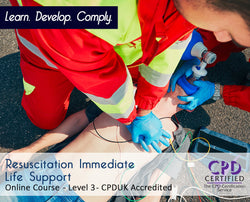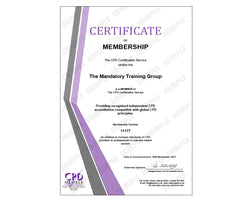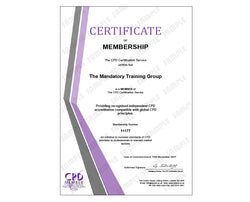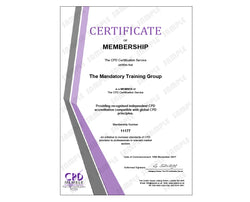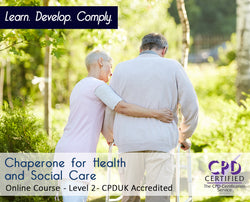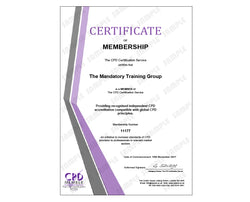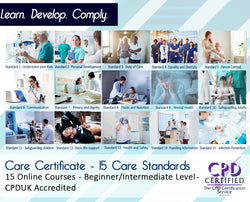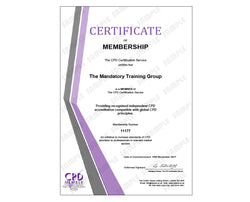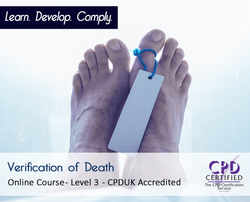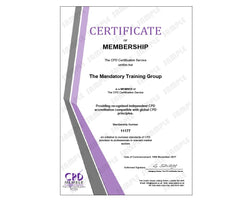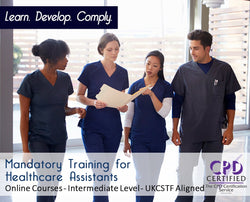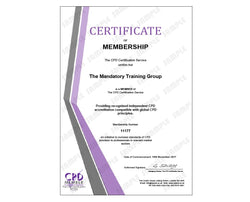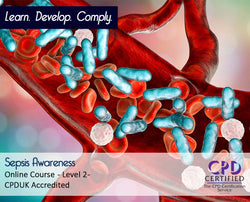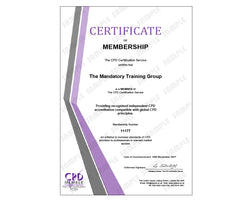Srabanti R.
Brilliant experience with the Safeguarding of vulnerable adults - Level 1, Level 2 & Level 3 courses with The Mandatory Training Group...
My journey through the online Safeguarding of vulnerable adults - Level 1, Level 2 & Level 3 study programmes with The Mandatory Training Group has been exceedingly worthwhile, very beneficial & highly enriching. These courses have helped me immensely for acquiring a thorough overview of the different ways in which particular individuals might be vulnerable. Living a life that is free from the risk of mental or physical abuse or neglect is a fundamental human right, which is also an essential requirement for health and well-being. For this purpose, I remain earnestly grateful to The Mandatory Training Group for providing me with the professional-level training online that meets with the set safeguarding standards of education, comprising of protecting the adults' right to live in safely, free from abuse and neglect, so as to provide them with safe & effective care and taking action to enable all people to have the best possible outcomes. Based on my personal learning experience, I am very happy to recommend this safeguarding training to everyone, especially for the professionals and volunteers, so that they are able to spot the signs of abuse and know how to act in order to safeguard the adults, thereby promoting the welfare & safety of vulnerable individuals. (Review comments written by Srabanti Ray, on Saturday, 24/06/2023).
Taylor Poole
This course was straight-forward, easy to understand and almost enjoyable to do!
Samuel Burke
So much relaxed doing the course at home on my own.
Joel McCarthy
The course was easy to follow and having the narration besides being able to read it yourself helps. Doing the training on the computer is like having a one to one course. Would recommend the training to my colleagues.
Maisie Campbell
The online course was very informative and explained everything in a clear manner which made it easy to understand
Natasha Forster
The course was very clear, informative, concise and done in such a way as to make me really think.
Oscar Rowley
I am used to the face to face training courses. ELearning isn’t quite the same. The course was ok though.
Henry Austin
Fantastic course enjoyed the contents and activities.
Isabella Payne
Overall I found the experience good. Good screen layout.
Robert Mellor
I found the course very well explained and the overall online course was very clear and easy to follow and listen to. It was so good to have your answers marked as you went along.
Natasha Kirk
Very quick, easy to learn and understand enjoyed learning and passing with The Mandatory Training Group. Now looking through other courses they can offer.
Jonathan Dunn
Seemed a thorough course.
Abigail Forster
Found the whole course quick and easy to do. Thanks
Craig Randall
An informative and simple to use site.
Alicia White
The online course is really comfortable and allows you to focus.
Archie Heath
The important concepts are clearly explained.
Shannon Carpenter
I am very happy to train with you and I want to thank you, because I was searching for a place to train but with you things are clear to understand. Thanks.
Mia Khan
It was easy to access and easy take breaks, getting back to the place you left off.
Daniel Watson
The subject of the course has been treated thoroughly and professionally.
Freya Clarke
This course was straightforward and easy to understand.
Declan Stokes
Very good course well explained and mapped out.
Jasmine Watkins
I liked this course easy to do online and at your own pace.
Amber Hope
An excellent user friendly interactive training.
Bradley Brennan
Paced just right. Interesting and easy to follow.
Peter Kerr
Brilliant I was able to do the course at my own pace and go back to read through things again .
Dylan Pope
I enjoyed this course and learnt a lot. I liked the fact that you did not have to do it all in one sitting. It has helped me understand the reason for specific procedures.
Maisie White
Easy to use, enough information to allow adequate knowledge of the course.
Georgina Rose
excellent course very informative and interesting
Georgina Rose
excellent course very informative and interesting
Jamie Davey
Very good course. Delivery excellent and very interesting indeed. Never bored. The content is quite relevant to my practice. I highly recommend it.
Brandon Watkins
Excellent course. Enjoyed not having the pleasure of sitting in a classroom with 20 others. Glad that I could do the course at home.
Andrew Sharpe
A very comprehensive course which was easy to follow and understand.
Millie Macdonald
I thought the course was interesting.
Lily Clark
It is very good because you can go back to the questions and start again.
Bethany Gilbert
Is so great to do these courses in the comfort of your own home.
Bethany Gilbert
Is so great to do these courses in the comfort of your own home.
Bethany White
Course was informative and had all the elements that are required.
Dylan Briggs
This was very interesting and a good way to challenge your knowledge.
Connor Sutton
It was very informative and I like the audio coverage. Will be using again
Samantha Short
Very good course, Interactive, simple to understand.
Mohammed Randall
Was very helpful and knowledgeable. Very easy to understand.
Kayleigh Barnes
Really useful and helpful course and content explained well.
Ella Barnett
The training was effective and efficient. The technology works well and the combination of visuals and audio was useful for me.
Luke Sinclair
It was easy to understand
Henry Lees
Very easy to understand, not too long to complete. The quizzes were very useful.
Eleanor Preston
The course was well presented with useful prompts to encourage learning.
Libby Myers
easily understood with clear examples
Nathan Burke
I did enjoy the course.
Summer Griffin
Very easy to follow course and very informative, great that you can do at your own speed
Zara May
It’s easy to complete the course.
Callum Johnson
Very positive experience. The course was easy to access and understand.
Ellis Harris
easy to follow well explained
Callum Johnson
Very positive experience. The course was easy to access and understand.
Charlie Brennan
Training can be done at a time that suits me.
Jamie Joyce
Excellent course. Easy to follow and great that it talks to you as well as displaying a presentation.
Summer Houghton
This course was easy to access. It was informative but not too dry. The level of content was just about right, it was easy to follow and dip in and out of as time permitted.
Hollie Gardner
Very informative, easy to understand. Thought it might be stressful but very well presented.
Spencer Hutchinson
that course was one of the best that i have been on
Spencer Hutchinson
that course was one of the best that i have been on
Sean Dale
Very informative and easy to follow. Enjoyed the assessment at the end.
Billy Pope
The course was clear and easy to understand and I have no problem with recommending it to others. Thank you.
Evie Archer
Very easy to do, no problem
Lewis Hilton
A good course with all modules had good information made it enjoyable.
Amelia Fleming
The units were easy to follow and I found it helpful having the odd question within the units. The questions in the test were clear.
Owen Ryan
Very easy to use and access. Quick too, considering I used my tablet not a laptop. Concise information.
Morgan Burton
I really like the fact that I could do the course in my own time
Harvey Chandler
I found this course very useful, to be able do it online at your own convenience is excellent. Thank you
Abigail Winter
Very useful and thought provoking course.
Molly Miles
Easy to understand and enjoyable to do
Sophie French
I found the course user friendly, it is nice being able to work through the sections at your own pace
Jennifer Ball
Very easy to follow clear and informative
Isabelle Francis
Presentation slides easy on the eye with none of the awful zooming and noise effects.
Courtney Hyde
It's really good to be able to do sections at a time at your own leisure rather than being brainwashed all at once in a classroom.
Charlie Banda
An excellent course. I would recommend and buy other courses from them. Easy to use the website.
Aimee Mwansa
The interface it's ok and I liked that it was all read by the voice on.
Amelia Birch
Love these online courses, well worth the money
Alice Norman
It is a very efficient and clear online training providing relevant information.
Luke Naylor
Would thoroughly recommend it.
Isobel McLean
The course is easy to understand and provides you with lots of information that you can use within your setting.
Luke Naylor
Would thoroughly recommend it.
Amy McLean
easy to listen to multiple choice answers a good overall understanding of the dangers
Maddison Rowe
Questions in the modules were varied and testing.
Lydia Goodwin
You get the login credentials pretty quickly. The courses are easy to follow. Does what it says on the tin
Finlay O'Donnell
A very easy training package to follow
Georgia Benson
Easy to understand. I liked the audio as it made it easier to remember than just reading the material.
Madison Leonard
Very good service, very understandable courses
Jude Collier
Really enjoyable and not difficult. Really only common sense but much of which we have forgotten. Will definitely be telling my friends about this.
Jude Collier
Really enjoyable and not difficult. Really only common sense but much of which we have forgotten. Will definitely be telling my friends about this.
Anna John
A fun few modules that landlords may find helpful.
Poppy Bradley
The course is well designed and flowed seamlessly.
Lucas Bull
I was surprised how easy the information was to understand. Well laid out.
Amelia Abbott
Very good course covered all i needed and it has audio and video as well as reading: superb 10/10
Amber Green
Website was very easy to use and all instructions on how to do the course were very clear.
Riley Vincent
Excellent and easy to follow.
Sophie Heath
The test is very important and necessarily
Kayleigh Gill
The course was designed well. Covered the key learning outcomes adequately.
Anthony Wood
Very informative and easy to follow modules.
Ewan Richards
This course presents all very clearly and very easy to understand and be oriented.












